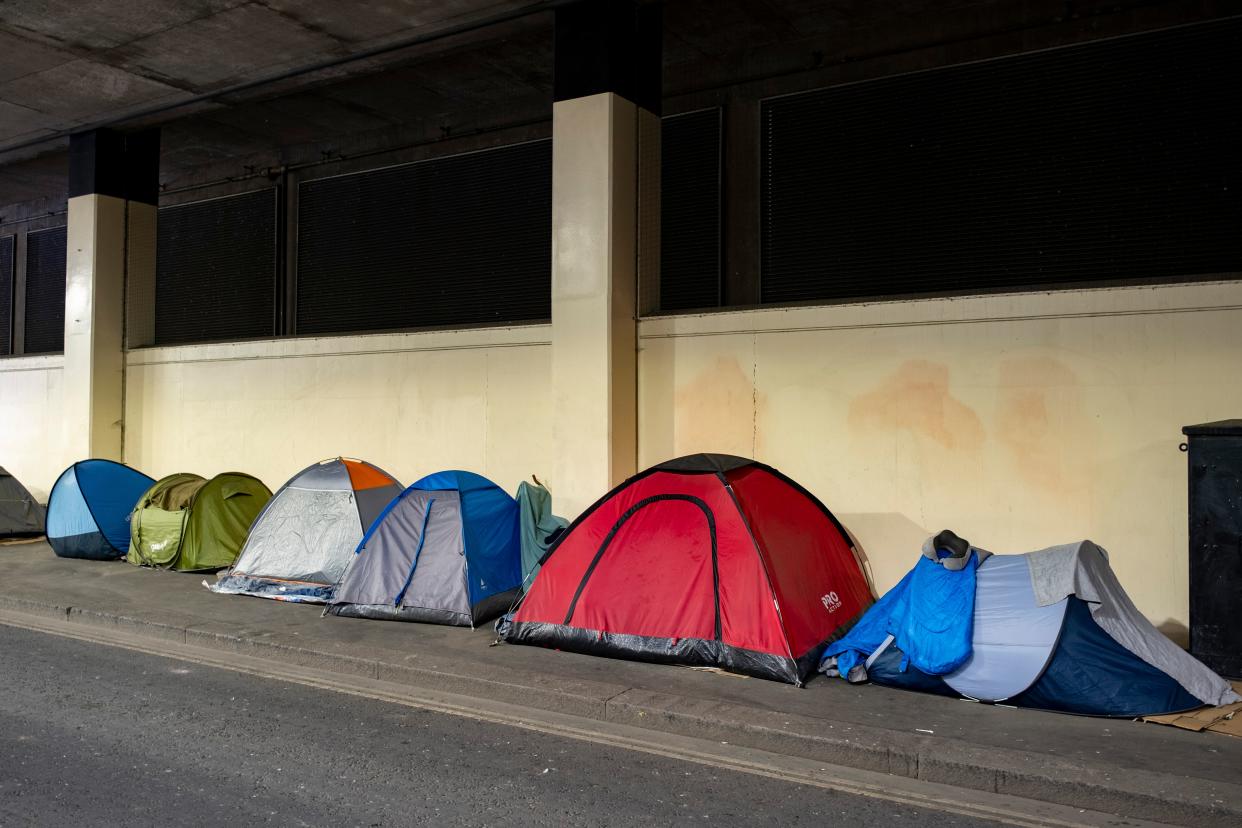Supreme Court Homelessness Case: What's at Stake in Grants Pass v. Gloria Johnson

Mike Kemp/Getty Images
The national housing crisis and related epidemic of homelessness have reached the US Supreme Court. On April 22, the Court heard arguments in City of Grants Pass v. Gloria Johnson, a case with high stakes for youth and adults experiencing homelessness. The case, likely to be decided this month, will determine the constitutionality of a city criminalizing homeless people, for sleeping in public with a blanket, in an effort to push them out of town. Adults have challenged the Grants Pass punitive ordinance, but the decision will also impact millions of young people nationwide who experience homelessness each year.
In 2013, when the Oregon city of Grants Pass adopted a plan to aggressively ticket, fine, and jail homeless individuals for sleeping in public, the city council president explained at a community roundtable that “the point” was to make it “uncomfortable enough” for people experiencing homelessness “so they will want to move on down the road.” This is an attempt to banish individuals for existing.
Homelessness poses unique challenges for youth. As we shared in an amicus brief joined by more than 200 expert organizations and individuals — including young people who have experienced homelessness — young people may be pushed out of home because of family challenges and then have trouble finding subsequent shelter because of their age. Criminalizing homelessness further undermines their long-term stability and well-being.
Across the country, young people are forced out of housing because they are running from physical or sexual abuse, have been rejected by family members, aged out of the foster care system with no safety net in place, or family mental health and economic challenges. In addition, Black, brown, and LGBTQ+ youth face homelessness at especially high rates because of the structural racism, discrimination, and rejection they face.
Jaxsyn*, who identifies as Two-Spirit and is Lakota, Cheyenne River Sioux Tribe, shares that as a teenager they received constant negative remarks from family members about their gender identity. The lack of acceptance contributed to their mother leaving home, and later their grandmother kicking them out of the hotel where they were staying. Without anyone to take them in or a youth shelter that would accept them, they grew fixated on the cold: the cold weather they would have to survive and the cold shoulder from loved ones.
Many young people like Jaxsyn face distinct challenges when trying to find shelter: There are not enough shelter beds dedicated to youth; many shelters specifically exclude youth, while shelters that house both youth and adults place young people at risk of victimization; and few youth know how to find the shelter beds that do exist for them.
As one young person, Faith*, recalls, “I was a kid. I was in school. My basic needs were being met by someone else, until without warning they weren’t. I didn’t know how to find a safe place to sleep or shower, much less how to locate and secure a job on my own.” Faith was turned away from one shelter because it was for men, then from a women’s detox shelter because she wasn’t using any substances.
Punishing young people with citations, fines, and jail time doesn’t fix the problem — in fact, it makes it worse. Police encounters can make it hard for youth to trust adults. Financial penalties create anxiety for youth, undermine family well-being, and increase recidivism rates. Incarceration causes lasting damage to youth mental and physical health, and a juvenile or criminal record can interfere with a young person’s progress toward education and employment. At the end of the day, this will cause more homelessness, not less.
Alexander*, who became unhoused at age 22, says that even after they had paid thousands of dollars in court fines, received needed mental health care, and started to get on their feet, their criminal record “added a lot of barriers to actually getting gainful employment and being able to stay off the streets.”
The US Supreme Court has long been clear that punishing an individual for their innocent or involuntary status constitutes cruel and unusual punishment in violation of the Eighth Amendment. Punishing the human need to sleep protected from cold certainly fits the bill. The Court should strike down the the Grants Pass punitive ordinance for being excessive and callous punishment.
If Grants Pass wants to curtail homelessness, it should look at what does work. For young people, this means ensuring affordable housing and living wages for families, and offering support to youth who have run away from abuse or been kicked out of their home because of their identity. It means assisting them with the tools they need to pursue an education and career goals, enabling them to grow into healthy adults. And it means valuing humanity.
As Alexander says, unhoused young people “just want to be loved and to know that we’re not… seen as a problem…. Healing and love are the answer. Not punishment, not criminalization.”
*Lambda Legal only uses first names for sources to protect young adults from social media attacks and bullying.
Stay up-to-date with the politics team. Sign up for the Teen Vogue Take
Originally Appeared on Teen Vogue
Want more U.S. government coverage?

